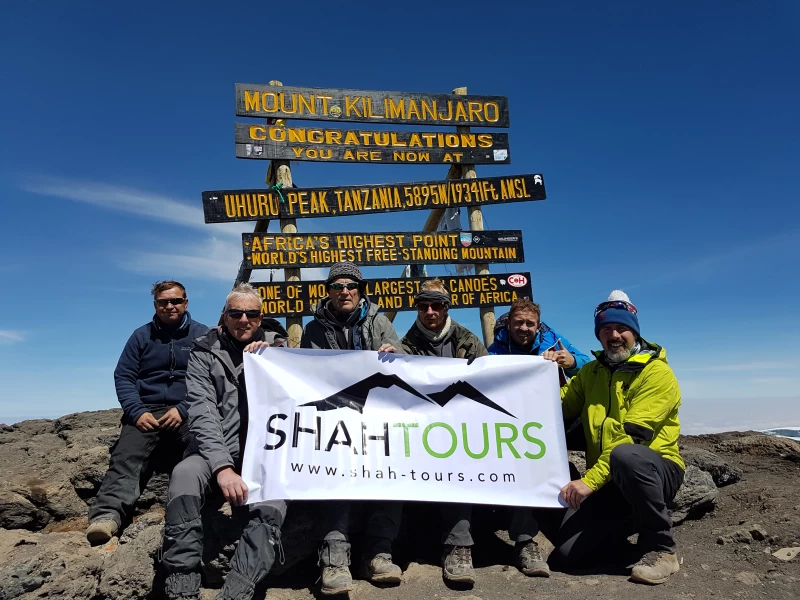Trekking along the Lemosho route: to the summit of Kilimanjaro!
Teilen
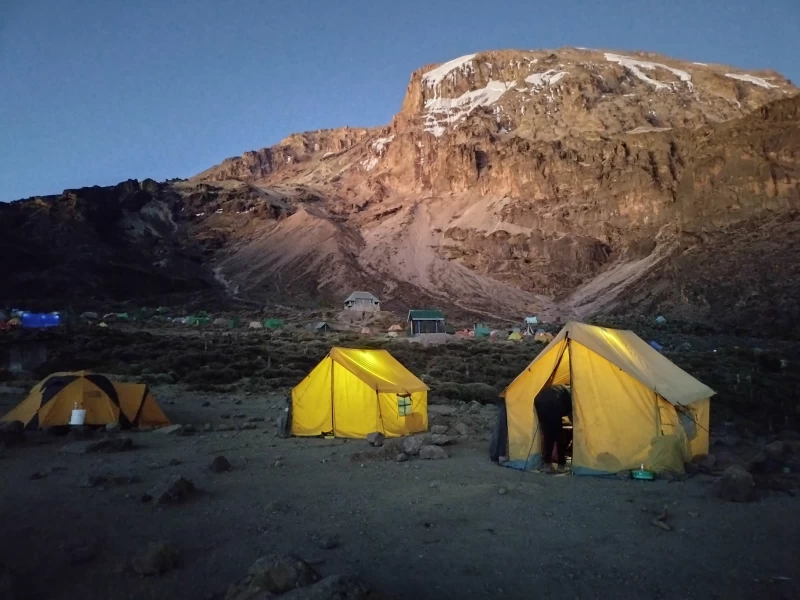
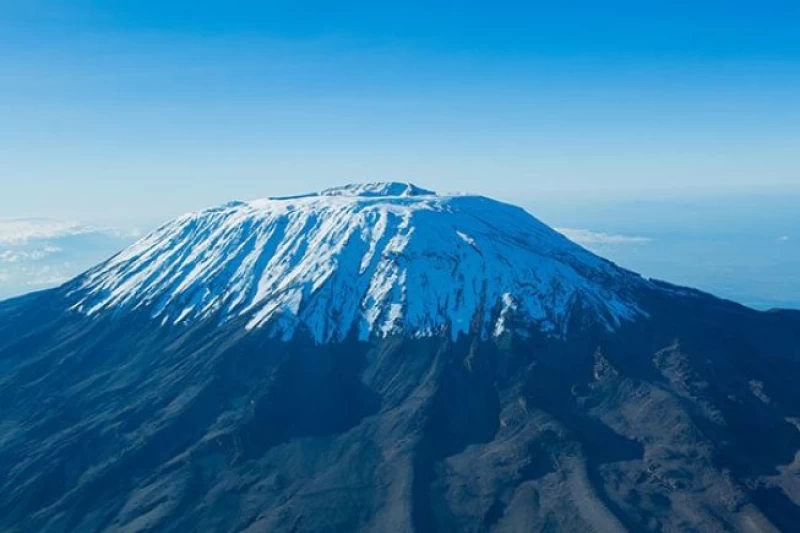
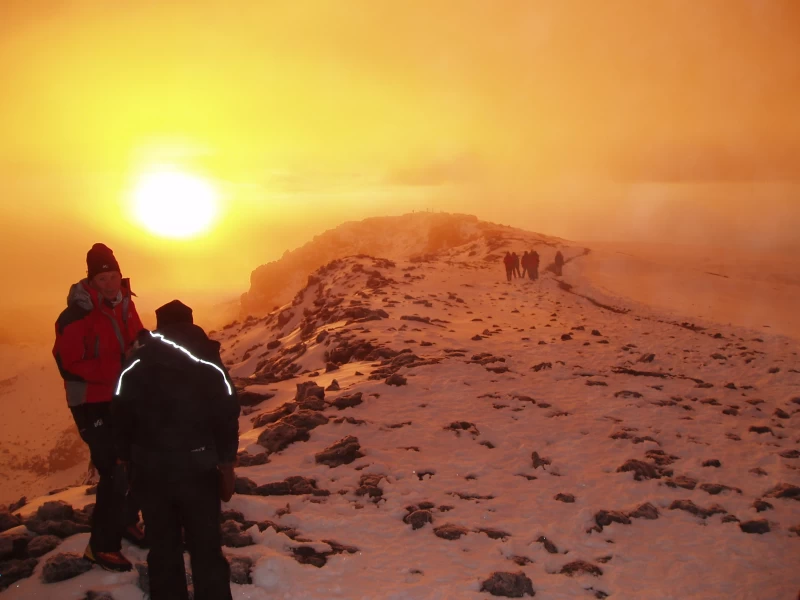
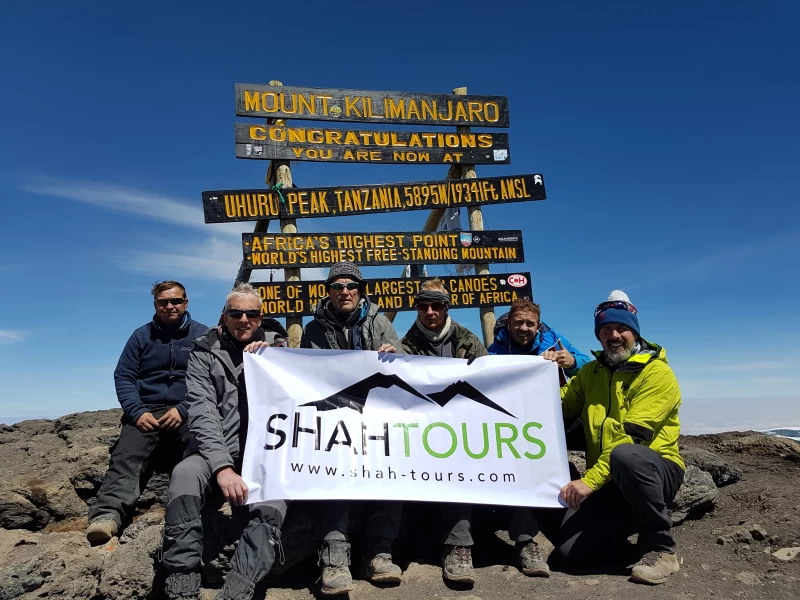

Alle Fotos ansehen
Zusammenfassung
Have you ever dreamed of climbing the highest mountain in Africa? We can make your dream come true by organizing a trek up Kilimanjaro to its summit at 5895 meters (19341 ft).
A trek on Kilimanjaro takes up to 8 days (there and back) via the Lemosho route and passes through the mountain's rainforest, heath and moorland, an alpine desert and a snow-covered, icy arctic zone at the summit. We say that climbing Kilimanjaro is like walking from the equator to the Arctic in just a few days.
No special technical equipment or experience is required and a well-equipped city dweller can reach the summit of Kilimanjaro just as easily as an experienced mountaineer. However, this does not mean that this is a luxury vacation. Instead, it will be a hiking adventure!
Fakten zu der Reise
Reisezeitraum:
Die Reise findet an 0 Terminen statt:
Mehr anzeigen
Reisedauer:
Diese Reise kann für 10 Tage gebucht werden.
Ort:
Kilimanjaro
Kilimanjaro, Tanzania
Verpflegung:
Inklusive Breakfast, Lunch, Dinner und Tea & Coffee
Durchschnittsalter:
16 - 60 Jahre
Sprachen:
English
Stornierungsbedingungen:
Umgebung & Aktivitäten
Experience the forest, the desert and the snow within a few days! Very few places on earth offer such a variety of vegetation and seasons in such a short time! We usually say that a hike on Kilimanjaro is like walking from the equator to the Arctic in just a few days.
During the hike we are accompanied by a variety of plants (flora), animals (fauna) and birds (avifauna). There are two main rainy seasons when there are fewer hikers due to the weather, namely the long rains between mid-March and May and the short rains in the second half of November. The other months are considered good times to climb, but can have a high number of tourists. However, the weather on the mountain is very unpredictable and we might encounter rain showers even in the dry months or have no rain during the rainy periods.
Zone 1 - Lower slopes
Around most of the lower slopes of the mountain you can see traces of human use, especially grazing land or agriculture. This has completely changed the natural vegetation patterns and what used to be scrub and lowland forest is now grassland or farmland. On the drier northern and eastern sides, some remnants of the former lowland vegetation can still be seen. The lower slopes of Kilimanjaro receive water that has fallen as rain in the forest zone and then seeped away through underground channels. It is this water and the fertile volcanic soil that supports the densely populated settlements.
Zone 2 - Rainforest
This is the richest zone on the mountain. A wide belt of extremely beautiful mountain forest surrounds the whole of Kilimanjaro and is well worth a visit, even if we don't climb to the top. 96% of the water on Kilimanjaro comes from this forest zone. Much of the rain that falls on the forest is absorbed by the thick layer of leaves and then seeps through the soil and porous lava rock to appear as springs further down.
Due to the humidity of the forest and the altitude, there is often a wide cloud zone in this area, especially between 2500-3000 meters. Protected from the sun by clouds, the moisture cannot evaporate easily, so there is high humidity, moisture and fog drops. Nights can be cold if it is clear and daytime temperatures are around 15-20°C.
Zone 3 - Low Alpine
Heath and moorland are overlapping zones. Temperatures can drop to below 0°C. Most of the precipitation in this zone comes from fog and haze at this altitude. This low alpine zone can be divided into two communities: Heath and Moorland. The climate is usually cool and clear, except for fog and haze at the tree line. Above 3000 meters frost becomes regular and the sun can be intense (which can cause sunburn on unprotected skin); surface temperatures during the day.
Zone 4 - Alpine Desert
This is the alpine zone where it is 'summer every day, winter every night'. There is intense radiation, high evaporation and huge daily temperature fluctuations. Nights are below 0°C, and during the day it can be up to 40°C in direct sunlight. Water is scarce and there is little soil to store moisture.
Zone 5 - Ice cap / Arctic zone
This area is characterized by arctic conditions - freezing cold at night and scorching hot during the day. Oxygen levels are about half sea level and there is little atmosphere to protect you from the sun's rays. There is practically no liquid surface water. Rain penetrates the porous rock immediately, but the rest of the moisture is trapped in the snow and ice.
Im Preis enthaltene Leistungen
1 night each in a lodge before and after the ascent in Moshi incl. breakfast
Trained, certified and experienced English-speaking mountain guide(s)
All national park fees, park entrance fees, camping or hut fees and rescue fees
Preliminary discussion and equipment check with the mountain guide in Moshi
Luggage storage during the trek
Basic sleeping mattress per person
Four-season tent, chairs, tables, dining tent for camping routes
1 x approx. 100 liter rubberized pannier / pack sack
1 emergency oxygen cylinder per group and first aid kit
2 x daily health checks with guides and a high-quality medical oximeter
All meals on the mountain as well as crockery, cutlery, bowls, cups etc.
Trained and experienced personal mountain chef and waiter
Boiled drinking water on the hike (from 1st hut/camp)
Hand washing station, disinfectant and small washbasin on the campsites
1 x luggage rack with a luggage weight of 15 kg per person
Specialized tent crew for the maintenance and construction of campsites
1 x transfer from a lodge in Moshi to the park entrances
1 x transfer from the park entrance to a lodge in Moshi
Transportation for remote gates (Londrossi / Rongai)
All applicable taxes and VAT
Shared group portable camping toilet (1 toilet shared between every 5 hikers) and optional use of shared public toilet facilities at huts or campsites
Optionale Leistungen
Private transfer from Kilimanjaro International Airport (JRO) to Moshi
80 €
pro Person
Shared shuttle airport transfer from Kilimanjaro International Airport (JRO) to Moshi
20 €
pro Person
Hier wirst du sein
Inspiration direkt ins Postfach
Melde dich für unseren Newsletter an und erhalte Insidertipps zu den schönsten Orten dieser Welt, Wissenswertes rund um deine Sportart und Exklusivangebote für Reisen, die du lieben wirst.

Aktive Traumurlaube
Qualitätsgeprüft und mit SEHR GUT bewertet! Mit unserer vielfältigen Auswahl findest du die Reise, die zu dir und deinen Wünschen passt.
Zum TripFinder
Flexible Buchungen
Transparent und stressfrei! Buche bequem dein Reisepaket zum besten Preis und nutze unsere flexiblen Stornierungsbedingungen mit 100% Rückerstattung.
Über flexibles Reisen
Authentische Erlebnisse
Wir lieben was wir tun! Das gleiche gilt für deine lokalen Gastgeber:innen überall auf der Welt. Gemeinsam sind wir immer für dich da!
Mehr über unsAb 2.445 €
für 9 Tage
